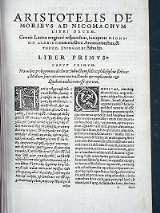
Nicomachean Ethics
Overview
is the name normally given to Aristotle
Aristotle
Aristotle was a Greek philosopher and polymath, a student of Plato and teacher of Alexander the Great. His writings cover many subjects, including physics, metaphysics, poetry, theater, music, logic, rhetoric, linguistics, politics, government, ethics, biology, and zoology...
's best known work on ethics
Ethics
Ethics, also known as moral philosophy, is a branch of philosophy that addresses questions about morality—that is, concepts such as good and evil, right and wrong, virtue and vice, justice and crime, etc.Major branches of ethics include:...
. The English version of the title derives from Greek
Ancient Greek
Ancient Greek is the stage of the Greek language in the periods spanning the times c. 9th–6th centuries BC, , c. 5th–4th centuries BC , and the c. 3rd century BC – 6th century AD of ancient Greece and the ancient world; being predated in the 2nd millennium BC by Mycenaean Greek...
Ἠθικὰ Νικομάχεια, transliterated Ethika Nikomacheia, which is sometimes also given in the genitive form as Ἠθικῶν Νικομαχείων, Ethikōn Nikomacheiōn. The Latin, which is also commonly used, is Ēthica Nicomachēa.
The work, which plays a pre-eminent role in defining Aristotelian ethics
Aristotelian ethics
Ethics as a subject begins with the works of Aristotle. In its original form, this subject is concerned with the question of virtue of character , or in other words having excellent and well-chosen habits. The acquisition of an excellent character is in turn aimed at living well and eudaimonia, a...
, consists of ten books, originally separate scrolls, and is understood to be based on notes from his lectures at the Lyceum
Lyceum
The lyceum is a category of educational institution defined within the education system of many countries, mainly in Europe. The definition varies between countries; usually it is a type of secondary school.-History:...
, which were either edited by or dedicated to Aristotle's son, Nicomachus
Nicomachus (son of Aristotle)
Nicomachus , lived c. 325 BC, was the son of Aristotle.The Suda states that he was from Stageira, a philosopher, a pupil of Theophrastus, and, according to Aristippus, his lover. He may have written a commentary on his father's lectures in physics...
.
The theme of the work is the Socratic question which had previously been explored in Plato's works, of how men should best live.
Unanswered Questions

